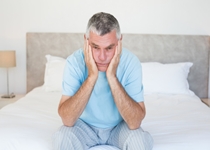 I know the coming of spring adds a little extra pep to my step. And maybe you feel the same way. It’s getting warmer, there’s more sunshine (and more vitamin D!), and there are bits of green starting to appear everywhere.
I know the coming of spring adds a little extra pep to my step. And maybe you feel the same way. It’s getting warmer, there’s more sunshine (and more vitamin D!), and there are bits of green starting to appear everywhere.
But there’s a certain group of people who might still be stuck in the dumps who need more than a change in weather to help them feel better. I found something in my recent perusals of news items that might be the answer they’re looking for.
Rhodiola rosea (R. rosea), or roseroot, is a widely used herbal supplement. In fact, it’s quite possible you’ve taken it to help increase energy or stamina, improve mental functioning, and even help the body resist cancer, colds, flu, and other conditions. Although this popular supplement doesn’t have a lot of scientific evidence backing it up just yet, it’s a big seller.
New research, however, is showing that roseroot may be an effective form of treatment against major depressive disorder. While this study was a smaller preliminary trial, it was a double-blind, placebo-controlled comparison study—the gold standard in scientific research.
You may know that depression is one of the most common—and debilitating—psychiatric conditions. In fact, it affects more than 19 million Americans each year. As many as 70% of people who suffer from mild to moderate major depressive disorder don’t respond to initial pharmaceutical therapy. Because these treatments can be expensive—and often full cycles are not completed—an alternative would be welcomed by very many people.
Now down to the nitty-gritty of the study I mentioned. Each participant in the study was diagnosed with mild to moderate major depressive disorder (they experienced two or more major depressive episodes, depressed mood, and a loss of pleasure for at least two weeks).
Over the 12-week trial period, one group was given a standardized dosage of R. rosea extract, one was given a common antidepressant called sertraline, and the other was given a placebo.
Compared to the placebo, the improvement in depressive symptoms of the people taking R. rosea and sertraline was minimal. Although the sertraline performed a little better, the difference was not statistically significant and also featured more adverse side effects. For example, the sertraline users were 63% more likely to experience nausea and 30% more likely to experience sexual dysfunction than the group who took R. rosea.
These outcomes demonstrate that the risk-to-benefit ratio of roseroot makes it a better option for people suffering from mild to moderate major depressive disorder—while being far more cost-effective.
It’s important to keep in mind that this is still a preliminary study. Larger observations need to take place to prove whether or not R. rosea really is an effective treatment for mild to moderate major depressive disorder.
Because there are few known adverse effects for taking R. rosea (it hasn’t been studied enough), it might be worthwhile in treating temporary depressive symptoms. Try taking the suggested dose for 10-12 weeks and see if you notice an improvement. Before starting a regimen, however, talk to your doctor. You want to be sure you’re not taking anything else that may cause a negative reaction.
See More :
- 14 Effective Homeopathic remedies for depression
- Depression Could Be Eating Away at Your Heart Health
- Get Active to Defeat Depression
- The Results are in: Does Vitamin D Help with Depression?
Source for Today’s Article:
Perelman School of Medicine at the University of Pennsylvania, “Roseroot herb shows promise as potential depression treatment option,” Science Daily, March 26, 2015; http://www.sciencedaily.com/releases/2015/03/150326112336.htm, last accessed April 7, 2015.
